必修2 Unit4 Wildlife protection Vocabulary 学案
- 格式:doc
- 大小:128.00 KB
- 文档页数:8
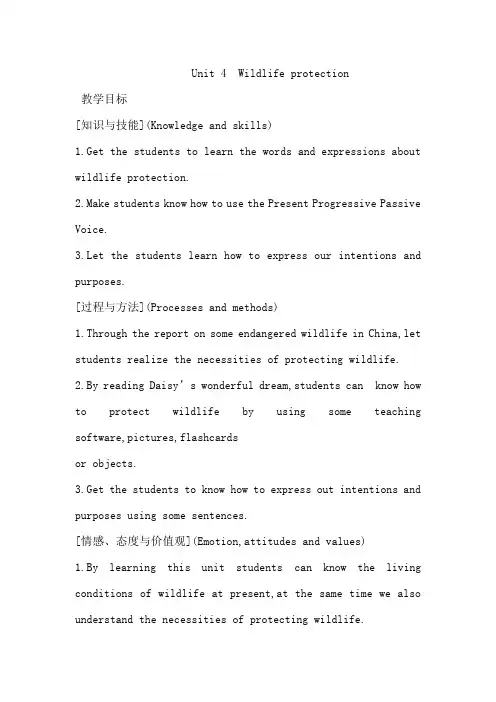
Unit 4 Wildlife protection教学目标[知识与技能](Knowledge and skills)1.Get the students to learn the words and expressions about wildlife protection.2.Make students know how to use the Present Progressive Passive Voice.3.Let the students learn how to express our intentions and purposes.[过程与方法](Processes and methods)1.Through the report on some endangered wildlife in China,let students realize the necessities of protecting wildlife.2.By reading Daisy’s wonderful dream,students can know how to protect wildlife by using some teaching software,pictures,flashcardsor objects.3.Get the students to know how to express out intentions and purposes using some sentences.[情感、态度与价值观](Emotion,attitudes and values)1.By learning this unit students can know the living conditions of wildlife at present,at the same time we also understand the necessities of protecting wildlife.2.The content makes students learn something about nature environment,the meaning of protecting wildlife,it can benefit harmonious development between animals and humans.学情分析该部分是本模块的阅读部分,课文重点描述了Daisy在梦中的一次奇妙的飞毯旅行。
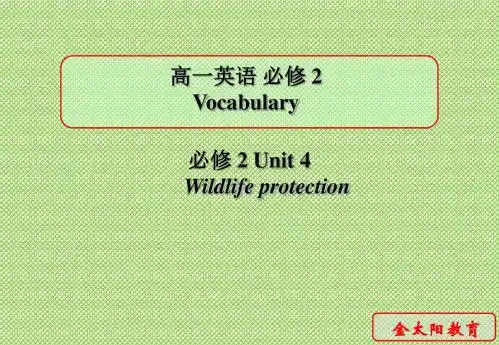
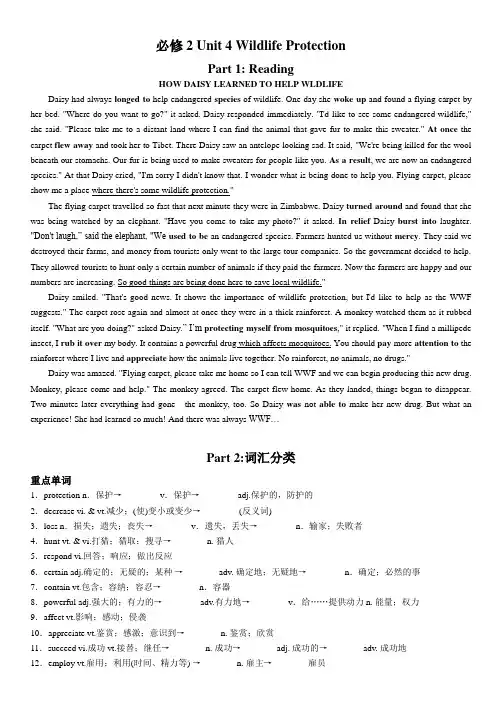
必修2Unit 4 Wildlife ProtectionPart 1: ReadingHOW DAISY LEARNED TO HELP WLDLIFEDaisy had always longed to help endangered species of wildlife. One day she woke up and found a flying carpet by her bed. "Where do you want to go?" it asked. Daisy responded immediately. "I'd like to see some endangered wildlife," she said. "Please take me to a distant land where I can find the animal that gave fur to make this sweater." At once the carpet flew away and took her to Tibet. There Daisy saw an antelope looking sad. It said, "We're being killed for the wool beneath our stomachs. Our fur is being used to make sweaters for people like you. As a result, we are now an endangered species." At that Daisy cried, "I'm sorry I didn't know that. I wonder what is being done to help you. Flying carpet, please show me a place where there's some wildlife protection."The flying carpet travelled so fast that next minute they were in Zimbabwe. Daisy turned around and found that she was being watched by an elephant. "Have you come to take my photo?" it asked.In relief Daisy burst into laughter. "Don't laugh,” said the elephant, "We used to be an endangered species. Farmers hunted us without mercy. They said we destroyed their farms, and money from tourists only went to the large tour companies. So the government decided to help. They allowed tourists to hunt only a certain number of animals if they paid the farmers. Now the farmers are happy and our numbers are increasing. So good things are being done here to save local wildlife."Daisy smiled. "That's good news. It shows the importance of wildlife protection, but I'd like to help as the WWF suggests." The carpet rose again and almost at once they were in a thick rainforest. A monkey watched them as it rubbed itself. "What are you doing?" asked Daisy.”I’m protecting myself from mosquitoes," it replied. "When I find a millipede insect, I rub it over my body. It contains a powerful drug which affects mosquitoes. You should pay more attentionto the rainforest where I live and appreciate how the animals live together. No rainforest, no animals, no drugs."Daisy was amazed. "Flying carpet, please take me home so I can tell WWF and we can begin producing this new drug. Monkey, please come and help." The monkey agreed. The carpet flew home. As they landed, things began to disappear. Two minutes later everything had gone - the monkey, too. So Daisy was not able to make her new drug. But what an experience! She had learned so much! And there was always WWF…Part 2:词汇分类重点单词1.protection n.保护→________ v.保护→________ adj.保护的,防护的2.decrease vi. & vt.减少;(使)变小或变少→________ (反义词)3.loss n.损失;遗失;丧失→________ v.遗失,丢失→________ n.输家;失败者4.hunt vt. & vi.打猎;猎取;搜寻→________n. 猎人5.respond vi.回答;响应;做出反应6.certain adj.确定的;无疑的;某种→________adv.确定地;无疑地→________ n.确定;必然的事7.contain vt.包含;容纳;容忍→________ n.容器8.powerful adj.强大的;有力的→________ adv.有力地→________ v.给……提供动力 n. 能量;权力9.affect vt.影响;感动;侵袭10.appreciate vt.鉴赏;感激;意识到→________n. 鉴赏;欣赏11.succeed vi.成功 vt.接替;继任→________n. 成功→________adj. 成功的→________adv. 成功地12.employ vt.雇用;利用(时间、精力等)→________n. 雇主→________雇员13.harm n. &vt.损害;危害→________ adj.有害的14.bite vt. & vi.咬;叮;刺痛→________(过去式)→________(过去分词)15.inspect vt.检查;视察16.fierce adj.凶猛的;猛烈的→________ adv.猛烈地→________ n.猛烈重点短语1.____________________ 灭亡;逐渐消失2.in peace ____________________3.in danger(of) ____________________4.____________________ 如释重负5.____________________ 突然笑起来6.protect...from ____________________7.____________________ 注意8.come into being ____________________9.____________________ 按照;根据……所说10.____________________ 危害11.without mercy ____________________12.____________________ 对……做出回答Part 3: 语言点讲解Ⅰ.重点单词短语详解1.die out 灭亡,逐渐消失与die相关的短语大汇总:die off (家族、种族等)相继死亡;(草木)先后枯死_______________ (声音、光线、风等)渐弱,渐息,平息die down (火、光线、兴奋、暴风雨等)渐弱,渐息;(声音)静下来_______________ 指死于疾病、衰老、饥饿、悲伤等die from ______________________________同步练习(1) Scientists said that those plants ________ ________ a century ago.科学家们说那些植物一个世纪前就绝种了。
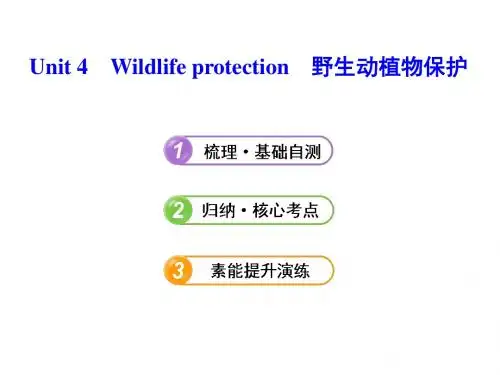
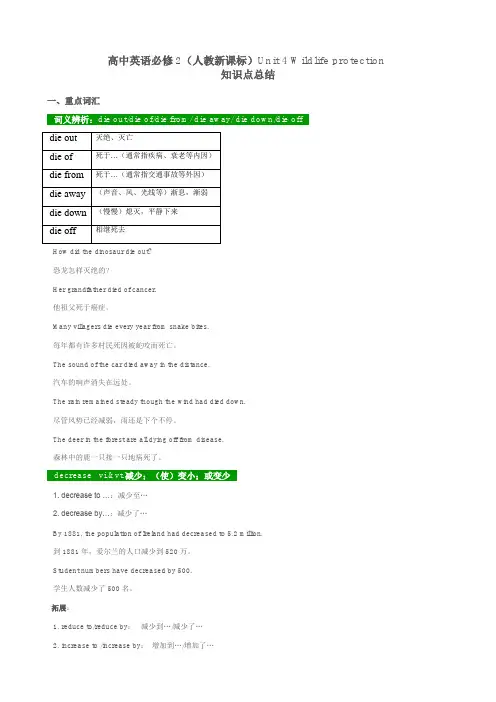
高中英语必修2(人教新课标)Unit 4 Wildlife protection知识点总结一、重点词汇How did the dinosaur die out?恐龙怎样灭绝的?Her grandfather died of cancer.他祖父死于癌症。
Many villagers die every year from snake bites.每年都有许多村民死因被蛇咬而死亡。
The sound of the car died away in the distance.汽车的响声消失在远处。
The rain remained steady though the wind had died down.尽管风势已经减弱,雨还是下个不停。
The deer in the forest are all dying off from disease.森林中的鹿一只接一只地病死了。
decrease vi.&vt.减少;(使)变小;或变少1. decrease to …:减少至…2. decrease by…:减少了…By 1881, the population of Ireland had decreased to 5.2 million.到1881年,爱尔兰的人口减少到520万。
Student numbers have decreased by 500.学生人数减少了500名。
拓展:1. reduce to/reduce by:减少到…/减少了…2. increase to /increase by:增加到…/增加了…1. be certain of/ about sth.:对…有把握(=be sure of/about sth.)2. be certain to do sth.:一定会做…3. a certain amount of:一定量的4. to a certain extent:一定程度上5. It is certain that…:肯定,一定会….(不能说It is sure that…)She is a confident woman who is certain of her views.她是一位充满自信的女性,对自己的观点深信不疑。
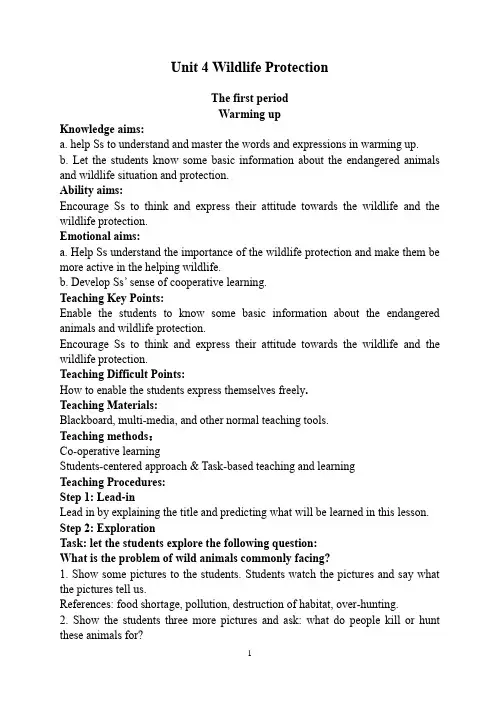
Unit 4 Wildlife ProtectionThe first periodWarming upKnowledge aims:a. help Ss to understand and master the words and expressions in warming up.b. Let the students know some basic information about the endangered animals and wildlife situation and protection.Ability aims:Encourage Ss to think and express their attitude towards the wildlife and the wildlife protection.Emotional aims:a. Help Ss understand the importance of the wildlife protection and make them be more active in the helping wildlife.b. Develop Ss’ sense of cooperative learning.Teaching Key Points:Enable the students to know some basic information about the endangered animals and wildlife protection.Encourage Ss to think and express their attitude towards the wildlife and the wildlife protection.Teaching Difficult Points:How to enable the students express themselves freely.Teaching Materials:Blackboard, multi-media, and other normal teaching tools.Teaching methods:Co-operative learningStudents-centered approach & Task-based teaching and learningTeaching Procedures:Step 1: Lead-inLead in by explaining the title and predicting what will be learned in this lesson. Step 2: ExplorationTask: let the students explore the following question:What is the problem of wild animals commonly facing?1. Show some pictures to the students. Students watch the pictures and say what the pictures tell us.References: food shortage, pollution, destruction of habitat, over-hunting.2. Show the students three more pictures and ask: what do people kill or hunt these animals for?From these pictures, students can conclude that people kill animals for food, for fur, for medicine and for works of art.3. Ask the students to give their answers to the question: What is the problem of wild animals commonly facing?Step 3: Discussion1. Let the students discuss the following question: why should we pay attention to wild animals and plants.Students discuss the question in groups and then give their opinions.2. After discussion, tell students what is wildlife protection about.Step 4: Group work1. Let the students read the report on some endangered wildlife in China at page 25, SB.2. Ask the students some questions about the report.3. Let the students describe the chart in small groups according to the sample.4. Discussion. More and more animals are killed by humans, as a student what should you do to protect the wild animals?Step 5: HomeworkWrite a composition according to the tips.假如你是一名记者,采访某动物园负责人有关国宝大熊猫的情况。
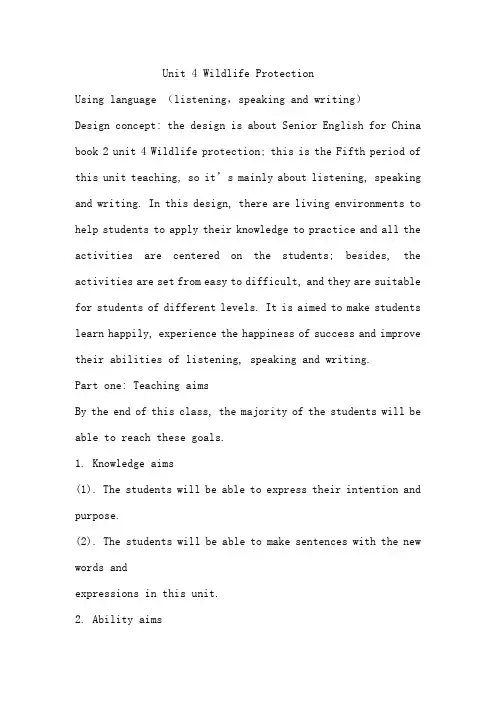
Unit 4 Wildlife ProtectionUsing language (listening,speaking and writing)Design concept: the design is about Senior English for China book 2 unit 4 Wildlife protection; this is the Fifth period of this unit teaching, so it’s mainly about listening, speaking and writing. In this design, there are living environments to help students to apply their knowledge to practice and all the activities are centered on the students; besides, the activities are set from easy to difficult, and they are suitable for students of different levels. It is aimed to make students learn happily, experience the happiness of success and improve their abilities of listening, speaking and writing.Part one: Teaching aimsBy the end of this class, the majority of the students will be able to reach these goals.1. Knowledge aims(1). The students will be able to express their intention and purpose.(2). The students will be able to make sentences with the new words andexpressions in this unit.2. Ability aims(1). Through listening, students will improve their listening ability, especially the ability to catch key words and the ability to analyze the information.(2).Students will be able to talk about the endangered animals and the ways to protect them.(3). Through writing practice, Ss will be able to improve their writing skills.3. Emotional aims(1). Stimulate students’ love for wildlife.(2). Cultivate students’ sense of cooperation and build up their confidence in learning English.Part two: The analysis of studentsAccording to the New Standard Curriculum and the New Syllabus and the artistic appreciation, students in grade one are supposed to learn to be independent and cooperative in learning; besides they should learn to find out questions, analyze questions and work out questions in English; meanwhile they are requested to form the habit of thinking in English. My students have just graduated from junior school, they are able to deal with some easy questions, so in this period, I want to help them to listen independently, discuss together and solve difficult questions by teamwork.Part three: The analysis of the teaching materialThe teaching content is from New Senior English For China Module 2, Unit 4 Wildlife protection. This is the fifth period of this unit, which is about the listening, speaking and writing. This unit is about wildlife protection. From learning this period, the students can apply what they have learnt to talk and write, so this period is very important in this unit teaching and learning it well is a must for the students.Teaching important and difficult points:Improve the students’listening ability, especially the ability to catch key words and analyze the information. Improve the students’ writing skills (the ability to “output”after listening and speaking.Part four: teaching conceptsTeaching serves students, so all the activities are centered on students. In the class, the teacher is a guide and helper. Because each student has his own strengths and weakness, and they may not at the same English level, the teacher should set questions of different levels to make every student feel the happiness of development and help them to experience success. Part five: teaching strategiesAccording to the artistic appreciation, the purposeof teaching English is to improve their abilities of language learning, develop their spirit of teamwor k, and help them to learn by themselves. Through listening and speaking, students get the content of writing and get the ideas organized, which makes the writing task easier. So in this period, all the activities are for the students, so the teacher should communicate with students, observe their emotions and make proper adjustment in the class.Part six: teaching environmentEnglish class is the only time when students can practice listening and spoken English, so in the class the students and teachers will mainly use English to learn and communicate. Of course, if the students have difficulty in understanding, I will translate them into English to help them cooperate well. Part seven: Teaching proceduresStep 1. Revision and goals introductionIn this Unit, we talked about wildlife protection, so we know lots of animals are dying out, and also plenty of animals have already disappeared. Today we have some new goals and tasks, so let’s learn it together. Purpose: Make the students be clear about the tasks in this class, and be more careful in learning.Step 2. ListeningTask 1. Wake up your earsPlay a game with the students to arouse their attention about listening.Purpose: attract the students’ attention and make them more careful in listening .Task 2. ListeningActivity 1. Before listeningLook through the questions in listening part, and predict what the listening material is about. Purpose: make the students be prepared for the listening exercise.Activity 2. while listeningLead the students to form the habit of grasping the important words and making notes when listening.For the first time, the students should do Exercise 1 to catch the main idea.For the second time, finish all the exercises on page 30. and try to check their answers.For the third time, ask the students to try to get more details. Activity 3. After listeningHelp the students try to retell what they have listened in their own words. Purpose: help the students get some informationthrough listening .Step 3. SpeakingActivity 1: Free talkCan you list any endangered animals?( Show some pictures to help students know about their present situation and the reasons why they are in danger. )Activity 2. Discussion1. Why are they in danger?2. What should we do to protect these endangered animals? (several minutes later, ask some volunteers to present their ideas.)Purpose: input some content and be prepared for the writing . Step 4. WritingWrite a letter to WWF based on what you have discussed, asking them tohelp save the endangered animals.Firstly, review the start and the end of a letter, be clear about the form of a letter.Secondly, plan the structure of the letter together.Dear xxx,para1: the present situationpara2: the reasonpara3: the measurespare4: conclusion or an appeal yours sincerelyxxx Thirdly, offer some useful expressions to help them writing.Para1: I am writing to…Para2: As we all know, The number of …There are many reasons why… Firstly ,…; secondly, …;thirdly,…Para3: It is time to … take measures to do Above all ,…;Besides, …;what’s more,… It’s a good idea to do… why notdo…?We had better do… We are supposed to doPara4: take action make a difference to… live inharmony withPurpose: give some supporting languages to help them expresstheir ideas freely.Then ask the students to write the letter individually.…..Give an evaluation standard, after the students finish writing,If there are different paragraphs to express your ideas.If there is a topic sentence in each paragraph.If the ideas are organized logically.If the tense and person are used correctly.If your expressions are used properly and vividly.If your handwriting is neat and easy to read.Then, ask students to swap with their desk mates to correct the mistakes.Purpose: make the students know about the writing standard, and learn to find mistakes during learning.Step 5. SummaryAsk the student on duty to make a summary of this period. Step 6. HomeworkPolish your own composition and write it on your exercise. Review this unit and do the exercises in your workbook. Step 7. Reflection after classIn this class, my students are the center, I designed various activities to try to make students involved in the whole class and improve their English learning During listening teaching, I lead them to catch key words and analyze the information. . From listening and discussing, students will make the writing task easier. Through writing, students have improved their writing skills. So from this class, the students form the habitof thinking individually and learning corporately, they have practiced their listening, speaking and writing ability, and improved their English learning. Therefore, this class has reached its original aims and it is a success精美句子1、善思则能“从无字句处读书”。
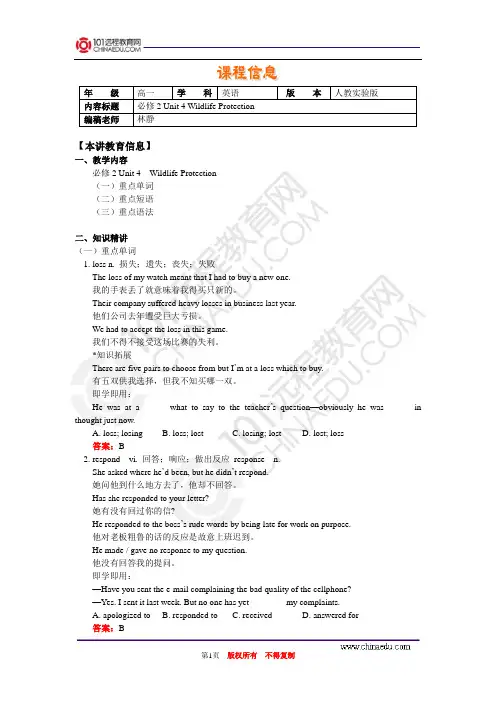
【本讲教育信息】一、教学内容必修2 Unit 4 Wildlife Protection(一)重点单词(二)重点短语(三)重点语法二、知识精讲(一)重点单词1. loss n. 损失;遗失;丧失;失败The loss of my watch meant that I had to buy a new one.我的手表丢了就意味着我得买只新的。
Their company suffered heavy losses in business last year.他们公司去年遭受巨大亏损。
We had to accept the loss in this game.我们不得不接受这场比赛的失利。
*知识拓展There are five pairs to choose from but I’m at a loss which to buy.有五双供我选择,但我不知买哪一双。
即学即用:He was at a ______what to say to the teacher’s question—obviously he was ______in thought just now.A. loss; losingB. loss; lostC. losing; lostD. lost; loss答案:B2. respond vi. 回答;响应;做出反应response n.She asked where he’d been, but he didn’t respond.她问他到什么地方去了,他却不回答。
Has she responded to your letter?她有没有回过你的信?He responded to the boss’s rude words by being late for work on purpose.他对老板粗鲁的话的反应是故意上班迟到。
He made / gave no response to my question.他没有回答我的提问。
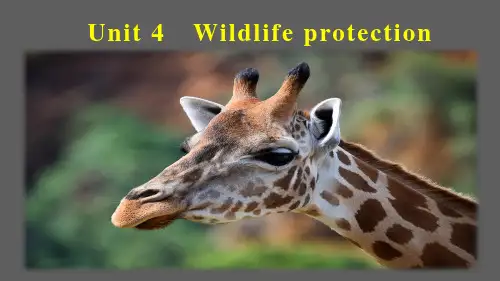
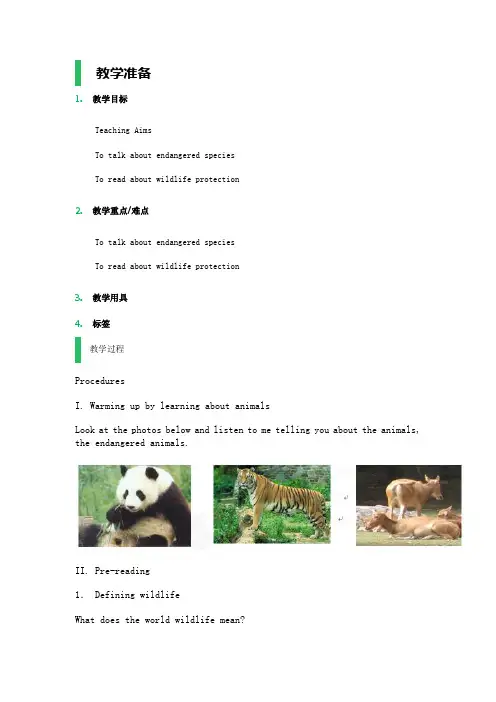
教学准备1. 教学目标Teaching AimsTo talk about endangered speciesTo read about wildlife protection2. 教学重点/难点To talk about endangered speciesTo read about wildlife protection3. 教学用具4. 标签教学过程ProceduresI. Warming up by learning about animalsLook at the photos below and listen to me telling you about the animals, the endangered animals.II. Pre-reading1. Defining wildlifeWhat does the world wildlife mean?2. Make a list of other endangered wildlife in China that is being protected.3. Pre-reading questions:4. Reading to the recordingNow turn to page 26, listening and reading to the recording of the text. Try to keep pace with the native reader, making your reading resemble that of the reader, in speed, in intonation and in pronunciation.III. Reading1. Reading and getting informationNow you are to read the text for information to fill in the form.2.Reading and underliningNext you are toread the text and underline all the collocations at the same time.Period 2: Learning about LanguagePlaying a gameLet’sgo on to play the game described on thet op of the page29. The following sentencesare to be passed on.. Studying ThePresent progressive Passive Voice1. Passive VoiceThe passive voice is used when focusing on the person or thingaffected by an action.ThePassive is formed: Passive Subject + To Be + Past ParticipleItis often used in business and in other areas where the object of the action ismore important than those who perform the action. For Example: We have producedover 20 different models in the past two years. Changes to: Over 20 differentmodels have been produced in the past two years.Ifthe agent (the performer of the action) is important, use “by.” For Example:TimWilson wrote The Flight to Brunnswick in 1987.The Flight to Brunnswick was written in 1987 by Tim Wilson.Onlyverbs that take an object can be used in the passive.Thefollowing chart includes sentences changed from the active to the passive inthe principal tenses.2. Passive Verb FormationThe passive forms of a verb are created by combininga form of the “to be verb.” with the past participle of the main verb. Otherhelping verbs are also sometimes present: “The measure could have been killedin committee.” The passive can be used, also, in various tenses. Let’s take a look at the passive forms of “design.”IV. Reading andidentifyingSince you are clear about PassiveVerb Formation, go back to page 26 and scan the text for all the examples of The Present Progressive Passive Voice.Now try to put the following sentences into The Present Progressive Passive Voice.▲They areproducingthi s new drug.▲Antelope islooking at her.▲They arekilling us for the wool.课后习题Please finish doing the exercise part 5, in the page 98, 40minutes.精美句子1、善思则能“从无字句处读书”。

Teaching PlanUnit 2 Wildlife ProtectionReadingHow Daisy Learned to Help Wildlife● Teaching Aims: (教学目标)Knowledge aims: (知识目标)a. help Ss to understand and master the words and expressions in reading.b. Let the students know some basic information about the endangered animalsand wildlife situation and protection.Ability aims: (能力目标)a. Train Ss to catch the key words or phrases in the reading.b. Encourage Ss to think and express their attitude towards the wildlife and thewildlife protection.c. Enhance Ss’ reading ability and develop Ss’ ability and skills of guessing wordsand reading comprehension.Emotional aims: (情感目标)a. Help Ss understand the importance of the wildlife protection and make thembe more active in the helping wildlife.b. Develop Ss’ sense of cooperative learning.● Teaching Key Points:(教学重点)a. To train the reading comprehension to the whole passageb. To improve Ss’ ability of listening, speaking, reading and writing.c. How to lead the students to organize their words and express them.● Teaching Difficult Points: (教学难点)a. Enhance the students reading skills in the passage.b. How to use the reading skills to make the passage better to understand..● Teaching Materials: (教学材料)Blackboard, multi-media, and other normal teaching tools.● Teaching meth ods:(教学方法)Co-operative learningActivity-based teaching (individual work; group work; class work)Students-centered approach & Task-based teaching and learning● Teaching Procedures: (教学过程)Step 1: Lead-in (导入)Task 1: Group WorkShow some familiar pictures to draw the students’ attentions to the wildlife, and bring the question: Do you think what wildlife are? Encourage Ss to discuss with each other and then solve the question together.Task 2: Class WorkSet up some related questions to make the whole class conclude what on earth mainly cause these wild animals in danger of disappearing. After discussing, Ss should mention the following reasons: Food shortage, pollution, destruction of habitats, and over-hunting. Meanwhile, teacher brings up the conception of “wildlife protection” in time.Step 2: Listening Task (听力)Play the tape of the reading passage, and ask Ss to finish the following questions, and tick all the mentioned words out while listening:◆ 1. What places did Daisy go?A. Tibet ChinaB. rain forestC. WWFD. Zimbabwe◆ 2. How many animals did she meet? What are they?A. antelopeB. elephantC. monkeyD. mosquitoes◆ 3. What helps Daisy meet the wildlife?A. By a flying chairB. By a flying broom(扫把)C. By a flying carpetSuggested answers: 1. ABD 2. ABC 3. CStep 4: Reading (阅读)I: Fast Reading (略读)Task 1:Read the passage quickly and silently. try to find out the main idea. Then answer the following question:The passage is mainly about ______.A. some protection of wildlifeB. a journey of a flying carpetC. Daisy’s wonderful experience with some animalsSuggested answer: CTask 2:Read the passage again and fill in the table within given time.II: Careful Reading (详读)Task 1: Read the passage and draw lines under phrases or sentences which you don’t understand.Task 2: Finish the true( T ) or false ( F ) questions, and try to correct the false.1. Daisy saw many antelopes in Tibet.2. Daisy’s sweater was made of sheep wool.3. The elephant used to be well protected in Zimbabwe.4. The farmers in Zimbabwe get much money from the elephants and rhinos now.5. This is a real sto ry in Daisy’s life.Suggested answers: F F F T FTask 3: Answer the following questions on the screen.1. Antelope in Tibet become endangered because:A. they are killed by other animals for food.B. The environment is badly polluted.C. People kill them to use their fur.D. their food chain(食物链) is cut off.2. The farmers hunted the Zimbabwe elephants without mercy becauseA. they wanted to sell the elephants for moneyB. their families were attacked with no compensations received.C. the number of elephants was so large that they eat too much food.D. Their farm were destroyed but they didn’t get any money from tourists.3. It can be learned from the text thatA. the Zimbabwe government did a good job in saving the elephants.B. the rainforest produces drugs that are good for millipede insectsC. the farmers also got some money from tourists after the WWF helped.D. mosquitos help protect moneys from millipede insects.4. It can be inferred from the text that next Daisy wouldA. go and buy a flying carpetB. work with WWF to help wildlifeC. laugh over what she had experiencedD. cry because she could not make her new drug.Suggested answers: C D A BStep 5: Consolidation (巩固)Use the proper words to fill in the form based on the text.Suggested answers: …Step 6: Homework Assignment (作业).In this class, we have learned the great urgency of the wildlife protection. As a student, what should we do to protect the wild animals? List your own opinions and organize your words to write a short passage about your solutions.●Reflection After Class: (课后反思)精美句子1、善思则能“从无字句处读书”。
Unit 4 Wildlife Protection------ReadingⅠ. The Analysis of Teaching MaterialThis unit is to introduce us the importance of wildlife protection. The reading passage is the main part of this unit. It can be divided into 3 parts, and the first part gives us the reasons why we need wildlife protection, the second part shows us a good example of wildlife protection, and the third part tells us that protecting wildlife is important in our daily life. From the passage, what students should master is not only the grammar and language points, but also the importance of wildlife protection.Ⅱ. The Analysis of StudentsAs senior high school students, they have the basic abilities of listening, speaking, reading and writing, they can use the simple words to express their ideas, but they are poor in vocabulary, and they lack of the skills of reading a passage, even most of them cannot get the basic information from reading. And the ability of writing a sentence is poor, so when doing reading , it is important to pick out some useful words and sentences for them to practice. In order to improve their English, students still need many opportunities to practice what they have learned, to express their ideas, feelings, and to develop their self-learning ability and cooperative learning ability.Ⅲ. Teaching Aims1.Knowledge aims:a. Enable the students to learn some key words and phrases related to wildlife protection.wildlife, protection, decrease, reserve, die out ,in danger(of),protect…from…etc.2.Ability aims:a. Enable the students to grasp the main idea of the passage, to scan for the needed information and to get the details.b. Improve the students’ ability of organizing and expressing their ideas in English.c. Improve Students’ reading ability and develop the skills of guessing words.d. Improve Students’ ability of putting the learning into using, and organizing theirideas into a composition.3.Emotional aims:a. Help the students understand the importance of wildlife protection and makethem be active in helping wildlife.b. Develop the students’ sense of cooperative learning.Ⅳ. Important Points1. To help the students get a general idea of the passage, and some detailed information as well.2. To help the students understand why we need wildlife protection and theimportance of wildlife protection.Ⅴ. Teaching Difficult Point1.To help students use their own words to express their idea .2. To help student get more information about endangered animals.Ⅵ. Teaching Methods1.Cooperative-learning:Individual work, pair work, group work.2. Task-based method.3. Skimming ,scanning method.4.PWP model.Ⅶ. Teaching AidsMultimedia, blackboard,pictures, ect.Ⅷ. Teaching DiagramⅨ.Teaching ProceduresStep 1:Greeting(1 min)Step 2:Lead-in(2 mins)Use the box to arose students’ interests,and ask them to guess what are in my box. Then present the animal models one by one to introduce some wildlife to students.(panda,south China tiger,elephant, Milu deer,rhino,ect.)T: Are they lovely? Yes, they are lovely and healthy... But now I will show you the other group of pictures.【设计意图】Step 3:Pre-reading (4 mins)Picture Show---Comparing two groups of pictureT shows the other group of pictures on the PPT (the ivory, the rhino horn, the fur of tiger, the injured wildlife and so on.) T asks ss to think the following questionsaccording to the pictures.Q1:What problems are they facing now?(Over-hunting /illegal hunting /lack habitat /lack food /pollution..)Q2:What’s the result (situati on) ?(number is decreasing ,be in danger of dying out,become endangered animals) Enable ss to realize the necessity of wildlife protection.【设计意图】Step4:While-reading(20 mins)Task one:Ask ss to scan the text to answer the three questions to get the basic information.1.Where did Daisy go?_________________________________________2. What animals did she meet? _________________________________________3. How did Daisy go there?_________________________________________【设计意图】引导学生查读文章的基本信息,了解文章结构和大意。
必修2 Unit4 Wildlife protectionPeriod 1 Words and expressions一.单词、短语识记:重点单词1. wildlife n.___________________2. ___________ adj.野生的;野的;未开发额;荒凉的3.____________ n. 栖息地;(动植物的)自然环境4. threaten vt. & vi._________________ →____________n.威胁,恐吓5._____________ vt. →____________ n.危险;危险物→ ______________adj. 濒临灭绝的;有生命危险的 6.____________ n. 保护区7. protection n.__________→____________ vt.保护→______________ adj.保护的,防护的8. ____________ vi. & vt.减少;(使)变小或变少→________________ n.& vi.& vt.增加;增长9.loss n._______________→________ v.遗失,丢失(过去式_________;过去分词__________) →_________ n.输家;失败者→__________adj.遗失的,失去的10.____________ vt. & vi.打猎;猎取;搜寻→____________n.猎人11. ____________ n. 地域;地区;地带12. _____________ n.种类;物种13.____________ n.地毯14. income n. __________15. respond vi._______________________→________________ n.回答;反应;回应16. distant adj.____________________→______________ n.距离17. fur n.____________________ 18. relief n. ______________________19. _______________ n. 笑;笑声→____________ vi.笑20._________ n.仁慈;宽恕;怜悯→_______________ adj.仁慈的;慈悲的;宽容的21.___________ adj.确定的;某一;一定→_________________adv.当然;行;必定22. ________________ n.重要(性)→_______________ adj. 重要的23.__________ vt.擦;摩擦________________ n.橡胶;橡皮;合成橡胶;按摩师24. mosquito n._________________ 25. insect n.____________26.___________ vt.包含;容纳;容忍→_______________ n.容器27._______________adj.强大的;有力的→________________adv.有力地;强大地→_____________ n.功率;力量;政权;势力28. affect vt._____________________→_______________ n.喜爱;感情→___________ n.影响;效果;作用29. ______________ n.注意;关注;注意力30.____________ vt.鉴赏;感激;意识到→______________ n.鉴赏;感谢;增值31._____________vi.成功;vt.接替;继任→_____________ n.成功→_______________ adj.成功的→ _______________adv.成功地32.___________ adj. 安全的;可靠33.extinction n._________________34. employ vt.____________________________ →_________________ n.雇主→__________________n.雇员;雇工35.dinosaur n._________________36. ___________ n. & vt.损害;危害→____________adj.有害的→__________ adj.无害的37. bite vt. & vi.__________________→________(过去式)→____________(过去分词)38. inspect vt._____________→______________ n.检查;视察→___________n.检查员;巡视员39._____________ n.事件;事故40. dust n.__________ →__________adj.落满灰尘的41. _________________ n.消失→_____________ vi.消失→_________________ n.外观,外貌,出现→__________vi. 出现,似乎42. fierce adj.________________→___________ adv.猛烈地;厉害地43.ending n._________________ →___________ vt. & vi.结束,终止;终结44.faithfully adv._______________________ →___________ adj. 忠实的,忠诚的→_____________ n. 信仰;信念;信任;忠实45. unexpected adj. _________________ 46.county n. ________________重点短语1._______________灭亡;逐渐消失2.___________________ 和平地;安详地;和睦地3.________________ 在危险中,垂危4.___________________ 如释重负;松了口气5._________________________ 突然笑起来( = _________________________ )6.___________________ 保护……不受……(危害)7.________________________ 注意8._____________________ 形成;产生9._________________按照;根据……所说10.__________________ 以致于;结果二.自主、合作、探究1. decrease vi.& vt. ____________________ ; (反义词) ___________vi.& vt.增加;增长;增强decrease (sth.) to/by ... 减少到/了……increase to/by ... 增加到/了……on the decrease/increase在减少/增加1) The number of students in the class has decreased __________20.班级里的人数减少了20人。
2) The membership decreased ______________ 150. 会员数减少到了150人。
3) Is crime___________________? 犯罪案件是否在减少?2. affect vt. ______________________________ →___________ n.影响;效果;作用常用短语为:have __________________ 对……有影响1) The amount of rain ________ the growth of crops.降雨量直接影响庄稼生长。
2) One of her lungs ____________ a little so that she has to rest.她的一叶肺有些感染,所以她不得不休息。
3) The audience ____________________ by his speech.4) The computer game ________________________ students’ study.3. appreciate vt._________________ → ______________ n.鉴赏;感谢;增值appreciate (doing) sth. I would appreciate it if/when... 如果……,我将不胜感激。
1) He highly __________________________. 他非常感谢他的帮助。
2) We shall _________________________you again. 我们将很高兴再次收到您的来信。
3) I really __________________________ to the party. 你能来参加这次聚会我太高兴了。
4) I would ___________________ you could help me. 如果你能帮助我,我将不胜感激。
4. mercy n. 仁慈;宽恕;宽容;恩惠;幸运;怜悯at the mercy of sb./sth. 任由某人(某事物)摆布或控制have mercy on/upon 对……有怜悯心show mercy to sb. 宽恕/怜悯某人without mercy 毫不留情地;残忍地They showed mercy to their enemies. 翻译:____________________________________The ship was ________________________the storm. 那只船在暴风雨中失去了控制。
5. hunt vi.&vt. _________________ hunt for 试图找到(某人/物) hunt after 探求;追求我正在找一本丢失的书。
翻译:Many people hunt after fame all their lives but never find it. ____________________________6. contain vt. ________________________ 侧重指内容或成分,其主语和宾语不属于同类。